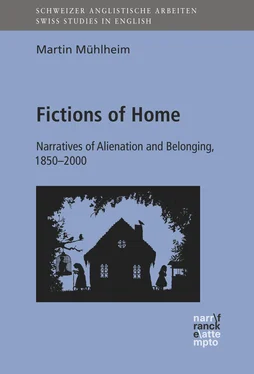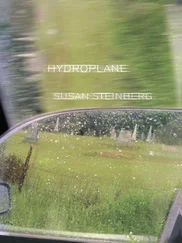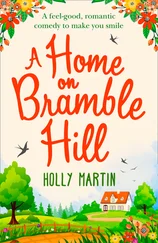Nostalgia, Mourning, and Ironic Distance: Novelistic Immaturity
Accordingly, we should read the novel’s generally nostalgicnostalgia mood not exclusively as a form of sentimental indulgence, but also as an implicit critique of social injusticeinjustice and thus as a potential basis for resistanceresistance. The nostalgicnostalgia mood of The Mill on the Floss is established in the very first chapter, through the narrator’s dreamy remembrances of how Dorlcote Mill and its surroundings “looked one February morning many years ago” (8; bk. 1, ch. 1; see BoumelhaBoumelha, Penny 20):
Just by the red-roofed town the tributary Ripple flows with a lively current into the Floss. How lovely the little river is, with its dark changing wavelets! It seems to me like a living companion while I wander along the bank, and listen to its low, placid voice, as to the voice of one who is deaf and loving. I remember those large dipping willows. I remember the stone bridge. (7; bk. 1, ch. 1)
This is not the detached, analytic tone one would expect from a “Study of Provincial Life” – the subtitle of Eliot’s later novel Middlemarch – but the nostalgicnostalgia voice of a narrator who longs for a time “when joys were vivid” (127; bk. 2, ch. 1). Instead of dismissing such nostalgicnostalgia longings as sentimental, Kimberley K. SmithSmith, Kimberley K. emphasizes their potential “as a mode of resistanceresistance” (523). SmithSmith, Kimberley K. shows that the term nostalgianostalgia, which was coined in 1688 by the Swiss physician Johan Hofer to denote a potentially fatal condition of homesicknesshomesickness, underwent a process of radical redefinition (509–510):
[N]ostalgia evolved from a disease into an emotion […]. The concept broadened and complicated: Once defined simply as a desiredesire to return home, to a specific place , nostalgianostalgia was gradually being conceptualized as a longing to return to a former time – and usually a time that was only imagined to be better. (512; original emphasis)
Eventually, SmithSmith, Kimberley K. continues, nostalgianostalgia was reduced to a sometimes painful, occasionally pleasant, but in either case unreliable, private emotion that is inevitably unrelated to any real political harm (519). For SmithSmith, Kimberley K., such a view of nostalgia mirrors a progressivist distrust towards any form of resistanceresistance to changechange, and is therefore “integral to the emotional regime of industrial capitalismcapitalism” (522) – for if those who resist changechange are always and everywhere ‘merely being nostalgicnostalgia,’ then their political objections can be conveniently disregarded.114
Accordingly, when reading the conclusion of The Mill on the Floss , we must not simply dismiss the novel’s tone as nostalgicnostalgia, but instead examine how such nostalgianostalgia contributes to the text’s critique of BildungBildung and the genregenre of the BildungsromanBildungsroman . The key for doing this lies in the problem of mourningmourning, which according to Franco MorettiMoretti, Franco can have no more than episodic significance in the classical Bildungsroman because it “does not contribute to Bildung ” (“The Comfort of Civilization” 132). Indicating a refusal to let go of the past, mourning constitutes an obstacle to the protagonist’s smooth, evolutionary development – and, implicitly, to his or her ‘progressprogress.’ Accordingly, while in the final chapter of The Mill on the Floss Eliot’s narrator at first seems to argue that time has the power to heal all wounds, it soon becomes clear that this is not in fact the case:
Nature repairs her ravages – repairs them with her sunshine, and with human laborlabor. The desolation wrought by that flood had left little visible trace on the face of the earth, five years after. […]
Nature repairs her ravages, but not all. The uptorn trees are not rooted again; the parted hills are left scarred; if there is a new growth, the trees are not the same as the old, and the hills underneath their green vesture bear the marks of the past rending. To the eyes that have dwelt on the past, there is no thorough repair. (422; “Conclusion”)
The Mill on the Floss does not, then, end on a confident note of progressprogress, but with the image of two men – Philip and Stephen – who continue to visit Maggie’s grave, feeling “that their keenest joy and keenest sorrow were for ever buried there” (422; “Conclusion”). As Susan Meyer points out, the novel’s nostalgianostalgia “exerts a more memorable and stronger force than the energyenergy of its forward movement” (131); the smooth river of progress finds itself checked by an indelible longing for the past. Only by forgetting the past can we hopehope to avoid mourningmourning and nostalgia. However, since our identities must, for Eliot’s narrator, have immovable roots in memory, to forget or deny the past would be tantamount to surrendering one’s selfself – the very self so cherished by advocates of BildungBildung .
This is not to suggest that nostalgianostalgia ought to become a privileged discoursediscourse in our relation to the past. We should, however, be aware that to dismiss nostalgia out of hand means to surrender a potent resource for social critique. Nostalgia is, first and foremost, an experience of homelessnesshomelessness, and as such an indication of discontent with the present:
[W]e should recognize that remembering positive aspects of the past does not necessarily indicate a desiredesire to return there. Remembering the past should instead be seen as a way to express valid desires and concerns about the present – in particular, about its relationship (or lack of relationship) to the past. (SmithSmith, Kimberley K. 523; original emphasis)
Nostalgia expresses desires and values that, in themselves, are neither necessarily sentimental nor illegitimate; after all, one reason for shying away from examining the past is, as Eliot’s narrator puts it, that “mankind is not disposed to look narrowly into the conduct of great victors when their victory is on the right side” (207; bk. 3, ch. 7) – i.e. one’s own. To dismiss any kind of longing for the past as ‘mere nostalgianostalgia’ may thus encourage, in both others and ourselves, an unwarranted sense of “ironicirony detachment” from both past injusticeinjustice and present harm (SmithSmith, Kimberley K. 515).115
In The Mill on the Floss , ironicirony detachment is in fact quite explicitly portrayed as a privilegeprivilege that the dispossessed cannot afford. In a lengthy passage that is itself supremely ironicirony (Raymond WilliamsWilliams, Raymond 172), Eliot’s narrator satirizes the beliefbelief that using ironyirony implies a lofty transcendencetranscendence of one’s limited, subjective point of view:
In writing the history of unfashionable families, one is apt to fall into a tone of emphasis which is very far from being the tone of good society, where principles and beliefs are not only of an extremely moderatemoderation kind, but are always presupposed, no subjects being eligible but such as can be touched with a light and graceful ironyirony. But then good society has its claret and its velvet carpets, its dinner-engagements six weeks deep, its opera and its faëry ball-rooms; rides off its ennui on thoroughbred horses; […] gets its sciencescience done by Faraday, and its religionreligion by the superior clergy who are to be met in the best houses – how should it have time or need for beliefbelief and emphasis? But good society, floated on gossamer wings of light irony, is of very expensive productionproduction; requiring nothing less than a wide and arduous national life condensed in unfragrant deafening factories, cramping itself in mines, sweating at furnaces, […] or else, spread over sheepwalks, and scattered in lonely houses and huts on the clayey or chalky corn-lands […]. This wide national life is based entirely on emphasis – the emphasis of want, which urges it into all the activities necessary for the maintenance of good society and light irony; it spends its heavy years often in a chill, uncarpeted fashion, amidst family discord unsoftened by long corridors. (238; bk. 4, ch. 3)
Читать дальше












